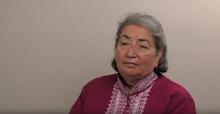
Born: Coahuila, Mexico
Maria D. Jimenez Flores was born in Coahuila, Mexico. Her parents, Raul Gomez Jimenez and Elva Flores, decided to immigrate to the United States when Maria was about six years old. Her paternal grandfather, Jaime Jimenez, was the first of her family to migrate to the United States. Maria and her family immigrated into Houston, Texas on May 9, 1957. Maria began to understand social inequality from a young age. With the influence of her maternal grandfather, Ramon Flores Ortega, and her father’s involvement in activism and social movements, Maria became interested in social justice. As she read many books about “La Revolución,” or the Mexican Revolution, Maria decided that social justice was her calling.
Maria’s father strongly encouraged Maria and her siblings to pursue higher education. At the age of thirteen years old, she decided that she was going to study political science in order to fight injustices. In high school, Maria was involved in many different organizations. She was a member of her school’s debate team and was aware of the many biases when participating in debate championships. Maria noticed that on occasion, she would lose or win oratory contests because of her nationality; she and her debate partner would also experience a loss due to gender and this further drove her passion for social change.
Maria and her family began to attend church when she was a teenager. Maria was involved in the Catholic Youth Organization. Her priest was also very involved in the Rio Grande farmworker strike[1]. Maria realized that religion was not for her, and in her last semester in high school, she became an atheist. She strongly believes in the process of humanity and this is what drives the way she approaches community change. After Maria graduated from high school, she decided to attend the University of Houston. She originally wanted to go to the University of Texas but did not have the resources to attend. In her first semester at the University of Houston, she became a member of the Young Democrats and while in the organization, she participated in the first lettuce boycott in Houston. In her second semester of college, Maria left the Young Democrats and she became a member of the Mexican American Youth Organization (MAYO). As a result of her activism with MAYO, she was asked to run for vice president of the Student Association. She ran for vice president and eventually became president of the UH student body. She was the first woman and first Chicana to be president of the organization. In 1972, they sponsored one of the first gay rights national conventions and also paid Cesar Chavez to speak at an activist rally.
In 1971, the national Conferencia de Mujeres Por La Raza conference was held in Houston at the YMCA to address Chicana and feminist issues. Maria believed that the conference was not at all inclusive and was only for middle-class white women. She was against the convention and many people did not consider her a feminist because of this. Maria strongly believed that she was a part of community feminism in which feminism was expressed through community work. Maria was twenty-one years old when she was first introduced to the Raza Unida Party (RUP), a third political party created by Chicana/o movement activists to elect Chicana/os to local and state office who would address minority and Chicana/o concerns. In 1974, Maria was heavily involved in the Raza Unida Party in Houston, becoming chair of the RUP convention and also helping to organize it. She eventually ran for Texas State Representative under the Raza Unida Party ticket, but quickly realized that politics was not for her and that she loves community organizing and developing social movements.
Maria identifies herself as a feminist but did not participate much in women’s movements of the time. Maria has always believed that the work to be done was within the community and women’s rights were fought within the general fight for equality. She believes that there are many complex issues that need attention, such as class and racial issues. Maria believes that change still has to be made, although there has been progress. Maria said in her interview that “when you begin to fight for liberation, it becomes a process,” and there are still many things that have to be addressed to achieve full equality in rights and dignity for all human beings.
[1] See also University of Houston’s Oral History of Houston Project, Interview with Maria Jimenez
https://digital.lib.uh.edu/collection/houhistory/item/2091/show/2090
